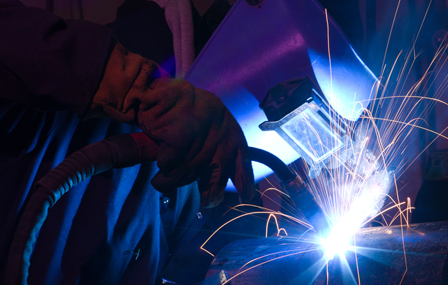Bruce Springsteen memorably sang, “You can’t start a fire without a spark.” Indeed, almost every manufacturing fire begins with a tiny spark generated by normal industrial processes. If these sparks wind up in your dust or fume collection system, they will often find a ready source of fuel that can become an inferno in minutes. Fortunately, it is possible to stop these sparks in their tracks. Simple physics are utilized with spark arrestance technologies to prevent sparks from turning into fires.
Understanding the “Fire Triangle”
Fire occurs as a result of a chemical combustion reaction. There are three factors needed to get a fire going: a fuel source, oxygen and a source of ignition. Eliminate any of these three factors and the fire dies. There are numerous different types of dust and emissions in manufacturing plants, often as a result from the manufacturing processes in the facility, but sometimes from other plant functions too, such as packaging. Many are not aware that the dust and fumes produced bye welding and metal cutting processes are often highly combustible. The particulate collected in a usual dust collector, combined with the filter media itself, can form a perform fuel source.
Oxygen is also found in abundance inside the dust collector. The airflow utilized to capture the fumes and draw them through the filters provides plenty of oxygen to feed and intensify a fire once it has started. The only factor still needed is an ignition source. Welding, plasma cutting, grinding and other applications can produce millions of sparks per day. It only takes one to ignite the ready fuel source waiting inside the dust collector.
Stopping Fires Before They Start
Reducing the number of sparks produced by welding, cutting and grinding is impossible — they are inherent to the processes. The key to eliminating fires in the dust collection system is preventing sparks from making it through the ductwork to the collector. Various approaches have been designed by engineers to spark arrestance over the years. All these approaches rely on some method of extinguishing sparks while they are in the ductwork, before they make it through the filtration system. To a degree, this happens by default when sparks are driven into the sides of the ductwork at turns and elbows. When sparks hit the cool metal ductwork, they are stripped of the thermal envelope that surrounds them. This allows them to cool, thus extinguishing the spark. Common spark arrestance technologies include:
- Baffles and metal mash filters that are designed to provide a tortuous path for sparks, cause them to bounce off multiple metal surfaces.
- Fixed-blade mixing vanes that create strong turbulence in the air stream, another way to strip off the thermal envelope.
- Simple plates placed in front of the dust inlet, which are designed to deflect sparks from entering the ductwork.
While all these products are effective to varying degrees, they have drawbacks in one form or another. Some require regular maintenance to be effective, and others create high restriction to airflow; which can drive up operating costs and lower the effectiveness of the dust collection system. Even worse, many do not effectively kill the sparks and hot embers, only providing a false sense of security to plant management teams.
A new spark arrestance system was introduced in 2015 which uses a patent-pending technology that relies on centrifugal force to extinguish sparks. High air flow velocity is maintained on all surfaces of the device to ensure it is self-cleaning, yet there is very little resistance to airflow. Using Computational Fluid Dynamics software, the design was perfected to allow engineers to simulate hundreds of different designs in order to optimize effectiveness. Over hundreds of hours of testing in heavy production environments, this system has proved to be the most advanced spark arrestance technology on the market today.
Selecting the Right System
When it comes to selecting the right spark arrestance technology for your operations, it comes down to two questions:
- How effective is it? Different technologies and models provide different success rates in eliminating sparks. In a comparative test of commercially available systems that was conducted, one unit allowed 180 sparks per minute to pass through, another allowed 300 sparks per minute to pass through, and a third allowed a whopping 4,760 sparks per minute to pass through. Each spark that makes it through the system is a potential fire waiting to happen. It is ideal that the number of sparks your spark arrestance systems allows to pass to be close to zero. In these same comparative tests, the new spark arrestance technology mentioned above stopped all the sparks from passing through to the collector.
- How efficient is it? One of the biggest downsides of many spark arrestance systems is their impact on airflow within the dust collector. This can be checked by looking at the “static pressure drop”; this is a measure of restriction to airflow, which will reduce the volume of air moving within the system. The system may not effectively capture the emissions from the process if air volume is reduced too much, resulting in smoke and fumes escaping into the plant. This is compensated by plant maintenance departments with the replacement of the filters sooner, sometimes when they are only halfway through their life. The issue can sometimes be countered by replacing the blower with a larger one, but of course this can be expensive, and significantly increase the energy use.
Lastly, you may also want to consider the maintenance cost factors. A self-cleaning system can not only reduce maintenance time and expense, but it can also help keep your system running at peak efficiency for longer.
Beyond Spark Arrestance
Even with a spark arrestance system that is 99.9 percent effective, it is still recommended to have back up fire suppression systems for your dust collectors. These systems can be literal lifesavers in the rare event that a spark makes it through the filters. To prevent fires from occurring in the dust collection unit, we need to go back to the Fire Triangle. The filters and particulate matter inside the collector provide an ample source of fuel and a stray spark provides the ignition. To prevent that small spark from growing into a raging fire, we need to tackle the third side of the triangle: oxygen.
When the dust collector is running, there is a ready supply of oxygen moving through the system when the dust collector is running as the dust collector sucks in air and particulates from the process and its surrounding environment. The next defense against fires that start within the collector itself is stopping that oxygen flow. The dust collector should be equipped with a detector device that is capably of sensing the presence of smoke that gets through the filters, which is a sign of either a torn or broken filter or a fire in the filters. Additionally, this detection system must automatically shut down the blower, and also the compressed air cleaning system, to reduce oxygen flow to the fire. Damper systems that automatically shut when smoke or heat is detected can further cut off oxygen supply. Fires will die down with airflow, which allows them to be attended to much easier.
If not attended to quickly, fire retardant chemicals provide the next line of defense. There are numerous types of fire suppressant systems available, ranging from dry chemical systems, special gases and, of course, H2O. At a minimum, external fire extinguishers should be readily available by every dust collector. For increased safety, consider an internal fire suppressant system. These systems target fire suppressant chemicals right where they are needed as soon as smoke or heat are detected inside the detector. This can limit the potential damage done by an internal dust collector fire significantly; instead of replacing a whole unit, your damage may be limited to a single filter. Additionally, the mess of deploying an external chemical fire extinguisher is avoided. In most scenarios, the fire will be extinguished before sprinkler systems are activated, avoiding significant cleanup costs and potential water-related equipment damage.
While sparks may be unavoidable in your operations, fires are not. Effective spark arrestance and fire suppressant technologies can drastically reduce your potential fire risks.



Elizabeth Bednar liked this on Facebook.
Mike Roles liked this on Facebook.